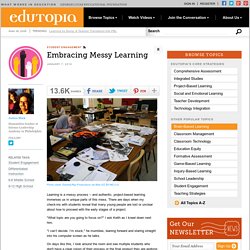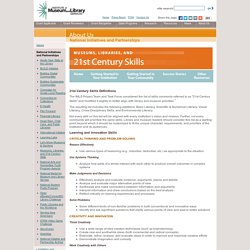

Embracing Messy Learning. Learning is a messy process -- and authentic, project-based learning immerses us in unique parts of this mess.

There are days when my check-ins with students reveal that many young people are lost or unclear about how to proceed with the early stages of a project. "What topic are you going to focus on? " I ask Keith as I kneel down next him. "I can’t decide. I’m stuck," he mumbles, leaning forward and staring straight into his computer screen as he talks. On days like this, I look around the room and see multiple students who don't have a clear vision of their process or the final product they are working towards. Understanding the Cycle I structure projects so that students have choice. I am slowly learning to embrace the struggles that students experience as they engage with authentic work.
Understanding the need for messiness, I attempt to structure class periods accordingly. A Project Example: Messiness to Polished Product Six years ago, I began a partnership with a dance company. Mobilizing Knowledge to Create Convenient Learning Moments. The world is shifting to a mobile-driven information society and employees are asking organizations to follow suit.

This is good news for companies, because providing convenient access to mobile-ready data allows employees to fit learning moments into their daily activities when and where they need it, thereby improving time-management, boosting performance, and increasing productivity. That said, just making information available on a mobile device doesn't make it effective and in fact may make it worse.
It needs to be accessible, digestible and engaging. When it Comes to Learning, Less is Often More Dealing with smaller screens and shorter attention spans requires distilling key concepts into easily digestible chunks of knowledge that are accessible on any device—smartphone, tablet, or laptop. Infinite learning. Always Doesn’t Live Here Anymore. Some of the most creative and flexible librarians I know have been working for more than a few years in libraries.

Some of the most inspiring and influential professionals in our field have had distinguished careers and still continue to make a mark on our governance and future. I was lucky to learn about collection development, reference service, and weeding during my public library days from professionals who had worked in the system for multiple decades.
These are the same folks who did not shy away from the Internet and its affordances in the mid 1990s. Scratch - Imagine, Program, Share. 21st Century Skills Definitions. The IMLS Project Team and Task Force considered the list of skills commonly referred to as "21st Century Skills" and modified it slightly to better align with library and museum priorities.1 The resulting list includes the following additions: Basic Literacy, Scientific & Numerical Literacy, Visual Literacy, Cross-Disciplinary Skills, and Environmental Literacy.

Not every skill on this list will be aligned with every institution’s vision and mission. Further, not every community will prioritize the same skills. Library and museum leaders should consider this list as a starting point beyond which it should be customized to fit the unique character, requirements, and priorities of the institution and its audiences. Reason Effectively Use various types of reasoning (e.g., inductive, deductive, etc.) as appropriate to the situation Use Systems Thinking Analyze how parts of a whole interact with each other to produce overall outcomes in complex systems Make Judgments and Decisions Solve Problems 1. The truly educated never graduate: Ashok Kurien at TEDxEMWS. CT: Personal Learning Networks. Johnson County Library. 5monkeys.jpg (JPEG Image, 1196 × 890 pixels) - Scaled (85%)